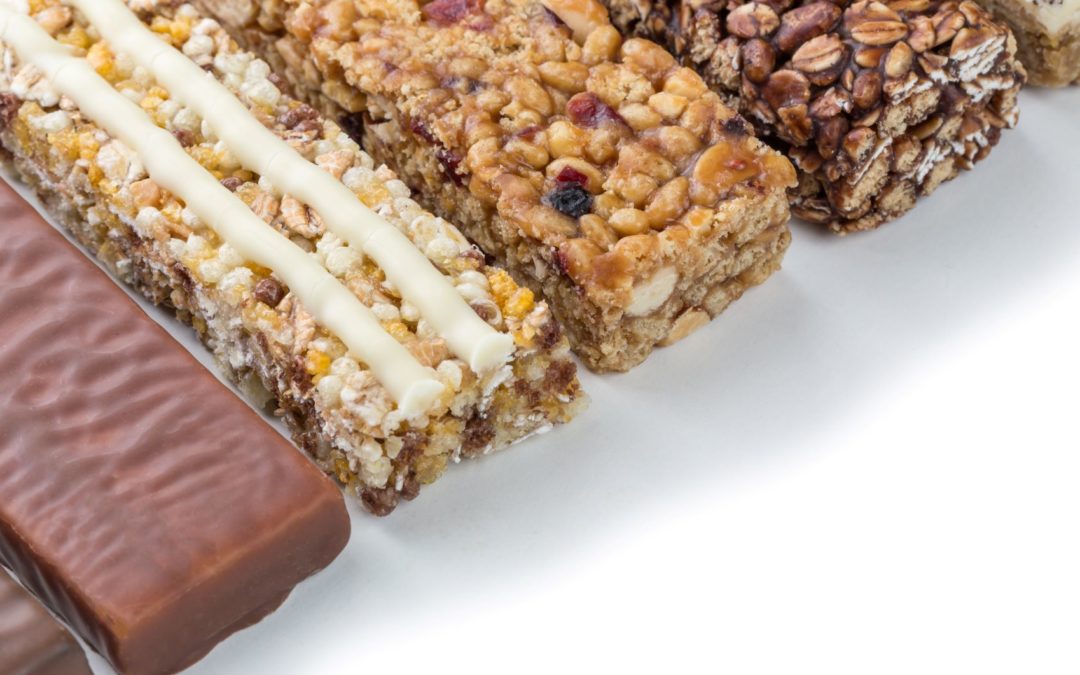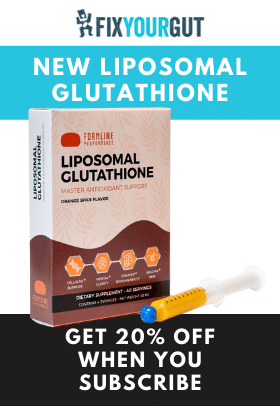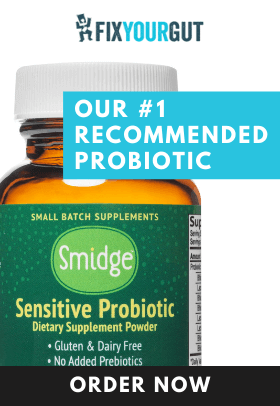The use of prebiotics is not always beneficial to people with digestive issues. When you incorrectly supplement prebiotics, they may cause you to either develop or worsen digestive ailments. For example, for people suffering from chronic constipation, many prebiotics will be broken down prematurely by your microbiome and ferment within the small intestine because of your slow transit time instead of correctly fermenting within your colon. Increased fermentation within the small intestine increases colony forming units within the gut and can cause or worsen small intestine bacterial overgrowth (SIBO). Most intestinal bacteria are saccharolytic; they obtain carbon and energy through fermentation of ingested host and dietary carbohydrates. Increased fermentation creates more gas and the depending on the health of your microbiome, hydrogen, methane, or hydrogen sulfide in increased concentrations can be produced further making you ill.3
However, when prebiotics are used correctly, they have numerous benefits to our microbiome and our body. Prebiotics, when taken, for example, may increase colonies of probiotic bacteria, including Akkermansia, Bifidobacteria, Faecalibacterium, Lactobacillus, and Roseburia and in doing so help improve digestion, relieve gut permeability, relieve inflammation, and improve our overall health. Probiotic bacteria compete with opportunistic bacteria that cause dysbiosis or infections, including Klebsiella, for example, and help to keep their colonies low within our microbiome. There are multiple studies of both Bifidobacteria and Lactobacillus antagonizing microbial pathogens. They do not allow them to adhere to the microbiome during foodborne illness and reduce/keep in check their colonies within our microbiome. Finally, feeding probiotic bacteria prebiotics increases the production of short-chain fatty acids including butyric acid (helps to provide energy for our colonocytes), acetic acid (lowers the pH of the digestive tract and is antimicrobial), and propionic acid (our body uses for energy production) which improve our health.4 5
The Benefits of Ingesting Inulin and Fructooligosaccharides (FOS)
Inulin are polymers composed mainly of fructans (the fructose units in inulins are joined by a β(2→1) glycosidic bonds) found in many different plants. Fructans are a polymer of fructose molecules, and fructans which are formed into short linear chains are known as fructooligosaccharides, and long cross-linked chains are known as inulin. Inulin and fructooligosaccharides are storage carbohydrates for tens of thousands of different plants used for energy during droughts or during the winter and help them to survive cold temperatures. Inulin is also a source of human soluble dietary fiber. Some foods that naturally contain inulin/FOS/fructans include asparagus (zero to three percent), chicory (fifteen to twenty percent), onion (two to six percent), leek (three to ten percent), garlic (nine to sixteen percent), dandelion leaves (twelve to fifteen percent), wheat (one to four percent), yacon (three to nineteen percent), artichoke (three to ten percent), and Jerusalem artichoke (sixteen to twenty percent). Supplemental inulin is usually extracted from chicory root and is added to many different products as a source of dietary fiber including, for example, Kind bars.6 7 8
Inulin is indigestible by our digestive system. We lack the intestinal enzymes necessary to metabolize inulin into fructose molecules so that we can absorb them. As a result, it passes through much of the digestive system intact unless microorganisms ferment the ingested inulin. Hopefully, the fermentation of inulin and FOS by microorganisms occurs within our colon, where a good majority of our gut microbiome resides. FOS has been found to increase the CFU’s (colony forming units) of the probiotic bacteria Akkermansia (FOS), Bifidobacteria, Lactobacillus (strains that live in the small intestine and the colon), Bacteroides (lower than fifteen grams daily), Roseburia, and Faecalibacterium prausnitzii. Reduction of opportunistic Candida, Clostridium, Desulfovibrio, some species of Enterobacteria (for example, Escherichia coli), Fusobacteria, and Helicobacter colonies have been seen with frequent ingestion of inulin and FOS as well. Inulin is also fermented by bacteria to yield short-chain fatty acids, including butyrate. Finally, ingestion of inulin and FOS induce changes of the intestinal mucosa characterized by higher villi, deeper crypts, increased number of goblet cells, and a thicker mucus layer on the colonic epithelium.9 10 11 12 13 14 15 16 17
The Problems With the Overuse of Inulin and Fructooligosaccharides (FOS)
Ingestion of inulin or fructooligosaccharides (FOS) for some people may cause or worsen dysbiosis and digestive issues. Fructans are FODMAPs (FODMAP stands for fermentable, oligo, di, monosaccharides, and polyols); therefore, inulin and FOS ingestion for some people with gut dysbiosis can lead to excessive gas production, abdominal pain, by increasing colonies of dysbiotic flora. In addition, people who suffer from fructose malabsorption might have to avoid the ingestion of fructans (including inulin and FOS) until it is resolved. Many people suffering from SIBO go on a low FODMAP diet to control the symptoms of increased fermentation from the ingestion of FODMAP’s. Fructans (inulin, FOS) are considered the greatest contributor to SIBO symptoms in most people. Therefore, they should be ingested in small quantities if at all for people who are sensitive to them. Finally, ingestion of fructooligosaccharides has been found to increase colony-forming units of Klebsiella. Klebsiella dysbiosis within our intestines is linked to intestinal permeability (leaky gut), urinary tract infections, lung infections, and the autoimmune conditions rheumatoid arthritis and ankylosing spondylitis. Inulin or FOS ingestion should be limited or avoided for people suffering from Klebsiella dysbiosis until it is resolved (however since fresh garlic is antimicrobial against Klebsiella it might be recommended for ingestion if tolerated, and you are not suffering from hydrogen sulfide dysbiosis).18 19 20
Some supplements use fructooligosaccharides (FOS) that are produced from the yeast Aspergillus niger. People who are sensitive to yeast ingestion or are suffering from Th2 dominance might react negatively (increased histamine or allergic reactions, for example) to FOS supplements sourced from Aspergillus niger. Therefore, they should be avoided. Make sure that your inulin or fructooligosaccharides supplement source is not produced using yeast fermentation, if possible. Though studies have shown that ingestion of inulin or FOS reduces Candida colonies within the digestive tract, yeast can still ferment them, so their ingestion can lead to worsening yeast dysbiosis. If you ingest inulin or FOS and your symptoms of yeast dysbiosis worsen, limit or discontinue your ingestion of them. Finally, isolated inulin or fructooligosaccharides found in prebiotic supplements or added to food might cause more symptoms than ingesting inulin foods, because of production methods or because they are isolated. For example, garlic contains inulin but it also contains various antimicrobial compounds that may reduce dysbiotic flora when ingested.21 22
Inulin and Fructooligosaccharides (FOS) Recommendations
I recommend that you ingest small amounts of the foods listed above that contain inulin/FOS/fructans and see if you can tolerate them. I would recommend trying one food daily and see which one you can tolerate in small amounts. For example, ingesting one clove of cooked garlic mixed in a meal or three spears of steamed asparagus to see if you can tolerate them. Once you have a list of foods that you can tolerate containing inulin/FOS/fructans, I suggest you add them to your diet and, over time, try to increase their ingested amounts.
Finally, one of the only inulin FOS supplements I recommend is Jarrow Prebiotic Inulin-FOS. The supplement contains Orafti Synergy1 brand inulin-FOS, which has been shown to digest slower and hopefully reach your colon before it is fermented to improve your health and microbiome. I recommend you start with one scoop daily in a glass of filtered water during breakfast. If you tolerate it well, you may increase four scoops total mixed well in filtered water to be consumed throughout the day during different meals. If your digestive symptoms worsen or you get increased gas production and bloating from ingestion, reduce the amount of the supplement you are taking daily to amounts that you can tolerate.
- https://www.ncbi.nlm.nih.gov/pmc/articles/PMC6463098/ ↩
- https://www.ncbi.nlm.nih.gov/pmc/articles/PMC6041804/ ↩
- https://www.ncbi.nlm.nih.gov/pmc/articles/PMC5847071/ ↩
- https://www.ncbi.nlm.nih.gov/pmc/articles/PMC6463098/ ↩
- https://www.ncbi.nlm.nih.gov/pmc/articles/PMC6041804/ ↩
- https://www.researchgate.net/figure/Quantity-of-inulin-present-in-some-foods_tbl2_260404230 ↩
- https://foodintolerances.org/fructan-and-fructooligosaccharide-content-of-food/ ↩
- Watson, Ronald, Preedy, Victor. Probiotics, Prebiotics, and Synbiotics: Bioactive Foods in Health Promotion, Academic Press; 1 edition, October 22, 2015 ↩
- Watson, Ronald, Preedy, Victor. Probiotics, Prebiotics, and Synbiotics: Bioactive Foods in Health Promotion, Academic Press; 1 edition, October 22, 2015 ↩
- https://www.ncbi.nlm.nih.gov/pmc/articles/PMC6223323/ ↩
- https://pubmed.ncbi.nlm.nih.gov/30016495/ ↩
- https://academic.oup.com/jn/article/137/11/2568S/4664507 ↩
- https://www.ncbi.nlm.nih.gov/pmc/articles/PMC6463098 ↩
- https://academic.oup.com/ajcn/article/109/6/1683/5479239 ↩
- https://www.ncbi.nlm.nih.gov/pmc/articles/PMC1265942/ ↩
- https://www.gastrojournal.org/article/S0016-5085(00)85229-4/pdf ↩
- https://academic.oup.com/cid/article/62/9/1143/1745140 ↩
- https://www.optibacprobiotics.com/uk/learning-lab/about/prebiotics/does-fos-prebiotic-feed-bad-bacteria-too#:~:text=’Recent%20studies%20have%20shown%20that,Spondylitis%20and%20increased%20intestinal%20permeability.&text=coli%20and%20Klebsiella.,to%20increase%20for%20the%20Klebsiella. ↩
- http://www.breakingtheviciouscycle.info/knowledge_base/detail/fos-fructooligosaccharides/ ↩
- https://www.ncbi.nlm.nih.gov/pmc/articles/PMC3934501/ ↩
- https://pubmed.ncbi.nlm.nih.gov/28344156/ ↩
- http://www.breakingtheviciouscycle.info/knowledge_base/detail/fos-fructooligosaccharides/ ↩







It is very important, in fact, not to forget that everything that you can do with your body needs to be further studied with a specialist. Who will help you and guide you in important points that you may not know, overlook or overlook. And most importantly, it will help you find out if you need it, whatever it is.
Hi John, hope you’re doing well. I don’t know if you remember me, I used to consult with you several years back during the bulletproof forum days. I remember you once mentioned to me a type of herb that has the ability to regenerate heart tissue. I tried to look it up on google but get mixed results. Would you mind sharing its name if you still remember what it was.
Best,
Ahmed
Red sage, Salvia miltiorrhiza, I hope all is well.
Hi John,
i am suffering from ibs d . i get sometimes mucous in stool and feeling of incomplete emptying of bowls. Its not loose stool . I have taken probioticslike saccharomyces boulardii , probiota histaminx and just thrive . They have helped me somewhat but still i have discomfort. I took just thrive for 2 months and i have increased frequency of stool . i am looking into nemchek protocol where he says to taje inulin and olive oil. What are your thoughts on that ?
I would be concerned that the inulin could cause dysbiosis without any other type of fiber or prebiotics ingested and worsen IBS.
John what’s your opinion of MUTAFLOR as a probiotic for gut health ! I had bad experience on bacillus subillis then I found your great article on dangers of that spore protected probiotic
fos inulin feeds as well unfriendly bacteria ”
does that apply as well to other prebiotics ? like
acacia fiber
and how about providing floraasist floraphage preforpro prephage tetraphage
will that allow to use all prebiotics without problem ?
What are you thoughts on this protocol?
https://www.nemechekconsultativemedicine.com/blog/reversing-autism-2017/
For patient who have had the Commonwealth Diagnostics SIBO test and have tested positive for SIBO?
I have ibs and sibo constant yeast infections and water infections and i am now on fodmap but just realised ive ate something with inulin in it and now am in a lot of discomfort, this is exactly true to my experience
The stance that the writer has on inulin at the end you know I disagree with it per my blog post. Following and organic of the Perfect Health Diet would be good. Proper sunlight exposure would be good as well. https://fixyourgut.com/improve-your-health-for-free-use-sunlight-for-vitamin-d/ Look into Bravo yogurt.
So would your recommendation be to use a small amount for a short time every once in awhile or just once?
Also, what are the alternatives to encouraging good bacteria to repopulate the gut?
Is the Organic Senegal acacia found in Heather’s fiber (brand) a low FOODMOP product Ct?
Will this particular fiber source help my IBS?
Yes, it should be. Many people use it and get good results with improving their microbiome and stool frequency.
I listened to a health webinar teaching that diagnosis of SIBO is extremely difficult due to unknown digestion times. How can I get an accurate diagnosis if this is the cause to my bloating and flatulence? I have been daily taking inulin to reduce constipation.
hi , ive had food severe food poisoning 4 days ago where i vomited 6 times and had diarrhea 7 times .
vomiting and diarrhea stopped after taking antibiotics .but i have been experiencing stomach pain and alot of burping . do you suggest i take pre and probiotics or will they worsen my condition or should i give it a few more days so it can be better on its own .
thank you in advance
I would ask your healthcare professional, but I would recommend the use of GOS. https://fixyourgut.com/recommended-prebiotic/
Sorry, but we’re not all expert in this area and the use of undefined acronyms does not help. FOS? SIBA? FODMAPS? It’s standard practice to give the complete name initially and then use the acronym.
FOS – fructooligosaccharide, SIBO – small intestine bacterial overgrowth, FODMAP – fermentable, Oligo-, Di-, Mono-saccharides And Polyols.
I agree. This post was a little confusing until scrolling down here to the comments and seeing these acronyms explained. Great info though! Glad I’m here!
In terms of chain length, I can tolerate all inulin food sources and chicory root powder except for Jerusalem Artichokes, but labelled FOS will bring on excessive and foul flatulence! I have read that the processed ones are usually shorter and fermented faster. Btw I also cannot tolerate potato starch, guar gum, baobab powder, figs, apricots or sugar alcohols. I can’t figure out a common fiber or sugar between these–anyone know which species consume them? My UBiome shows no enteric pathogens present. Also no Bifidos or Lactos despite probiotics and prebiotic diet. Main issue is high number of Desulfovibrio bacteria (SRB) so I can only figure they are consuming Hydrogen produced from beneficial fermentation in combo with sulfur.
I’m going to try pepto bismol to lower SRB’s and will try GOS and arabinogalactans as alternate fibers to feed the beneficials.
Klebsiella?
Thanks for the suggestion. It was my thought too before test…but taxa not present.
Wish I had lady farts…I know this is an old post but did you ever get to the bottom of your gut issue? You sound like me with tests up the whazoo but no definitive answer. I’m looking into doing the Aperiomics test tho. I also suspect a parasite as they don’t show up all the time on the tests.
What about doing colon reflorastation using probiotic with fos if you have Sibo? I understand from Dr. Siebecker that there are 6 studies that indicate using probiotics are just as effective as antibiotics. If we use the probiotic in the colon wouldn’t that be better than swallowing them?
Thank you.
I have a severe case of C-Diff caused by an antibiotic. I am taking VSL-3 along with Dificid (second time round). Will the prebiotic supplements feed the bad bacteria as well as the good bacteria?
Most do. Collagen and GOS are least likely to cause issues feeding the opportunistic bacteria.
Have you tired Saccharomyces Boulardii!
I am so very confused now about FOS. I was reading earlier that they provide a food source for beneficial bacteria and yet now I am reading here that they also feed the wrong kind of bacteria? I am incredibly lost. I am looking for a probiotic for my 6yr old son who suffers from thrush (mainly oral). I will be starting him on a course of grapefruit seed extract which kills good and bad bacteria in the gut and so need a good, ‘safe’ probiotic to repopulate his gut, preferably free from sugar, sucrose, colours, flavours etc!!
Any recommendations/advice would be much, much appreciated please!! Thanks
Hi that the problem trying to kill something you can’t your body have to do it. Grapefruit extract would just make it worse you got a lot to learn
Fighting candida and thrush currently, Ive had thrush for over 10 years. I can say with the utmost certainty that currently I am beating my thrush for the first time. The mixture I use is brush well, pull oil through your mouth for 10 to 15 afterword, and finish rinsing with salt water.
Important part is the coconut oil pulling, this is a natural antifungal. It is necessary to spit oil out afterward because it is full of toxins.
Good luck on your journey.
Adam, can you explain this” brush well” protocol better? I am also dealing with thrush.
Good advice. I had a Doctor’s Data test done through a professional naturopathic physician. I was found to have a pathogenic amount of Citrobacter freundii, which feeds on fructooligosaccharides. I am going on a low-FOS diet with some targeted antimicrobials and antifungals to rebalance. I’m glad I didn’t take an inulin and FOS supplement before, it just would have made symptoms worse.
I had the same results from dr data. What supps are u taking and are u taking an antibiotic? My good bacteria was.low also. Dont feel well on probiotics. Dont know what to do
did ou get rid of citrobacter freundii? i felt a lot worst having loads veg now i know why
thanks
As I am searching for supplementing my diet with Lactobacillus rhamnosus, though am not keen on ingesting FOS as it might be linked to increasing the gut population of Klebsiella, I am looking for an alternative to ingest these micro-organisms without being supplemented with FOS. Do you have any idea of such a product existing?
Only one to my knowledge: https://www.pureformulas.com/russian-choice-immune-75-grams-powder-by-allergy-research-group.html
I think you miss the point with SIBO. It is not caused by prebiotics or by FODMAPs. There is enough evidence right now to know that it is caused by food poisoning which damages the gut nerves. If we’re talking about people whi have it, and what to prevent reccurence, than yes, maybe it is wise to avoid, but I would probably go prokinetic route instead, and try to go back to normal diet.
If your diet is rich in prebiotics and FODMAPs it could cause an increase of probiotic bacteria that spill over into the small intestine. This however is not the only cause of SIBO. Gastroparesis and slow intestinal emptying can cause SIBO, by causing more matter to be able to ferment in the large intestine and cause the same reaction to happen and I mention it in my book and on my website.
Food poisoning, can contribute to developing SIBO if the use of antibiotics occurs. Most of the time the illness we call “food poisoning” actually occurs from ingesting the toxins that the bacteria produce, which is what makes us ill, and not the actual bacteria themselves. Foodborne intestinal infections can occur, but they are much rarer.
Also, for your reference, http://scholar.google.com/scholar?hl=en&q=SIBO+and+foodborne+infections&btnG=&as_sdt=1%2C34&as_sdtp=, there have been no studies done to prove your theory.
There have been studies done linking food poisoning to SIBO. Chapter 7 of Pimental’s book ‘A New IBS Solution’ is all about that.
Yes, there have, I have written about it, https://fixyourgut.com/a-new-test-to-determine-sibo/. There are however multiple causes of SIBO.